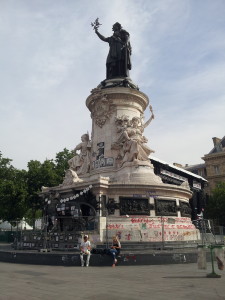 The recent hiatus and travel provided some time to experience the broader world and consider the themes of happiness, belonging, compassion and so on from a perspective outside of my normal (narrow?) day to day. Being exposed to centuries of foreign culture for weeks at a time was thrilling and at the same time the flood of details was enormously overwhelming in person. That’s what’s nice about armchair travelling or documentaries – the focus is supplied, the details are managed, the experience is curated for you by the book editor or narrator. In person, the reality is that you’re in queues, desperate to find a loo (or to find the right change to use the loo), hungry, and/or transfixed by the fact that each street has different ornate light posts (or some other mindboggling thing that everyone else is able to walk past but you want to scream to the world “LOOK AT THIS!”).
The recent hiatus and travel provided some time to experience the broader world and consider the themes of happiness, belonging, compassion and so on from a perspective outside of my normal (narrow?) day to day. Being exposed to centuries of foreign culture for weeks at a time was thrilling and at the same time the flood of details was enormously overwhelming in person. That’s what’s nice about armchair travelling or documentaries – the focus is supplied, the details are managed, the experience is curated for you by the book editor or narrator. In person, the reality is that you’re in queues, desperate to find a loo (or to find the right change to use the loo), hungry, and/or transfixed by the fact that each street has different ornate light posts (or some other mindboggling thing that everyone else is able to walk past but you want to scream to the world “LOOK AT THIS!”).
It is of course an evolutionary survival mechanism that all animals have developed a way of filtering information to only that which is most likely of value to them. Humans have loads of biologically initiated filters. For example, we are good at depth perception and spotting movement (as for a long time we were a prey species) once we got the hang of tools we’ve worked to our strengths ever since. We create more tools that work mostly by combining our sight with our hands (every thought about the inputs and outputs of a computer?) rather than, say, through sound and other frequencies of vibration. Because we build all the things we use, we tend to reinforce our own preferences and strengths, we also send ourselves the message that we’re increasingly successful by this filtering. So to travel to somewhere completely different, where comparatively few things were familiar, was to bypass the existing filters and be opened up all over again to confusion, curiosity and wonder.
Wonder is exhausting.
Great, but exhausting. Confusing too, and when you come home you go through it all over again with things that you used to comfortable with and now you’re not that sure about. That’s also amazing (and exhausting). Before you know it the day-to-day of going to work intrudes and you find yourself back in the harness of being a wage slave, but this is the gift of travel. It is possible (necessary) to remember that we have a choice about the way we see and experience the world. It is not just fun to go somewhere else, it helps train our brain in remember that our filters aren’t truths. For us to find ways to solve the problems we’ve created in our worlds, the most useful thing to do is to think differently about it.
You would probably like to punch the next person who suggests to you that you “think outside of the box” about something causing trouble. I know I’d love to. It is useless. If we could, we would! So instead let’s share ways of learning to shift our perspective, and one of the critical steps to that is to realise what things actions or ‘realities’ we’re taking for granted, what we’re valuing and filtering for, then we can put those assumptions aside and invite in some wonder. A recent article talked about how cities, by their man-mad nature, reinforce some of our mental models and that this creates a (another) blind spot in how we face challenges. Especially ecological challenges.
The difference between watching a documentary about a city and being lost in the metro there is an experience of being ‘reset’, of being a beginner, a foreigner. How valuable it can be to know that you know nothing. We can be the best kind of stranger to ourselves and to others by sharing perspectives and becoming more than the sum of our filters. Let’s get wonder-ful together.
